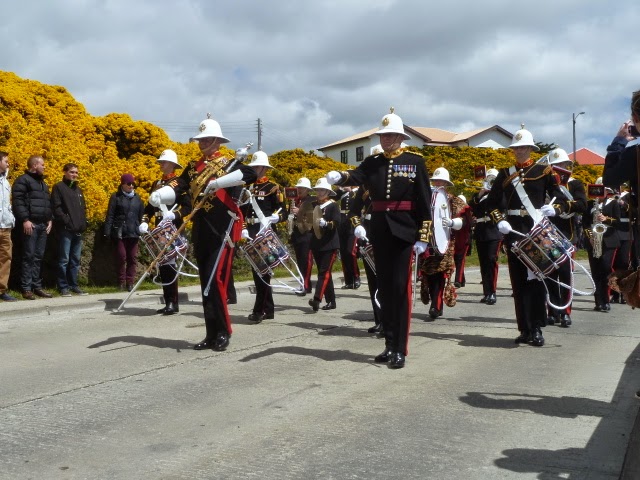The Falkland Island are, and were, a remote archipelago, and prior to the Panama Canal opening in 1913, Port Stanley was occasionally a safe harbour for ships damaged or blown off course after rounding Cape Horn. Very much a quiet backwater......
However, on December 8th, 1914, events near Stanley, the capital, brought the Falkland Islands to the notice of the world for the first time.
 |
| Royal Marines Band |
But, just a few weeks earlier, it was the Royal Navy that had suffered horrendous losses in the Battle of Coronel, just off the Chilean coast. 1,600 sailors were killed as British ships were sunk by the stronger German fleet.
 |
| Royal Navy |
 |
| Royal British Legion and other civilian groups. |
 |
| Memorial wall with plaques about to be unveiled. "Adversaries in War; Companions in Death" |
 |
| Flotilla of small boats |
With my tour guide hat on, I often get asked by visitors, "Why?" Why is this spot on the map British? "What earthly interest did Great Britain have in a wind-swept archipelago, miles from anywhere and in some of the roughest seas in the world?"
 |
| The Governor inspects the parade |
In an unstable world, where people were throwing off colonial rule, the Falklands became an indispensable and reliable haven for ships going round Cape Horn to California and Australia, and to explore "Terra Incognita" - Antarctica.
 |
| Marine Band. Battle Monument |
So, the descendants of Admirals Craddock (defeated at Coronel), Sturdee (victorious at the Falklands) and Graf von Spee (victor at Coronel and defeated at the Falklands) were invited to participate in events to mark the sacrifice made by both navies.
 |
| Combined parade march past |
A new memorial for both sides of the conflict was unveiled, and a flotilla of small ships sailed down the harbour in the brisk south-westerly.
The Marines Band, as they did all week, marched and played stirring music.....
"Hearts of Oak". "The Great Escape" - yes! Even some Bond themes!
They are all superb musicians, each playing a minimum of two instruments.
 |
| Falkland Islands Defence Force. |
 |
| Taking the salute at Government House. |
 |
| "Eyes........Right!" |
 |
| Flotilla of launches. |
 |
| Malvina House Hotel flagpoles. |
 |
| Beating the Retreat |
At the end of the week of commemorations, another memorial was unveiled, this time by local descendants of 8 members of the Falkland Islands Volunteer Force who died in a tragic accident on December 1st 1914.
 |
| Cairn, with the Canache in backround |
While crossing a narrow strip of water, their punt capsized, and, fully-laden with coats and packs, 8 of them drowned a few yards from shore.
The impact of this tragedy on such a small community, on top of the news of the imminent arrival of an invading German fleet, is hard to imagine.
So, it was an emotional week for many. But the visitors apparently felt that it was such a fitting gesture by the Falklanders - to bring together the families of the commanders of opposing fleets.
The guests had enjoyed a full programme for their week. When not viewing the famous wildlife or visiting a sheep farm, they were being entertained by the local Amateur Dramatic society, in the shape of a Edwardian Music Hall concert, with the addition of sketches from the BBC Blackadder WW1 series! A great time was had by all, including the audience!
More details of the Battle of the Falklands can be found here >>>>>
http://www.rmg.co.uk/researchers/collections/by-type/archive-and-library/item-of-the-month/previous/the-battle-of-the-falkland-islands-1914
Have a peaceful Christmas
Peter









No comments:
Post a Comment